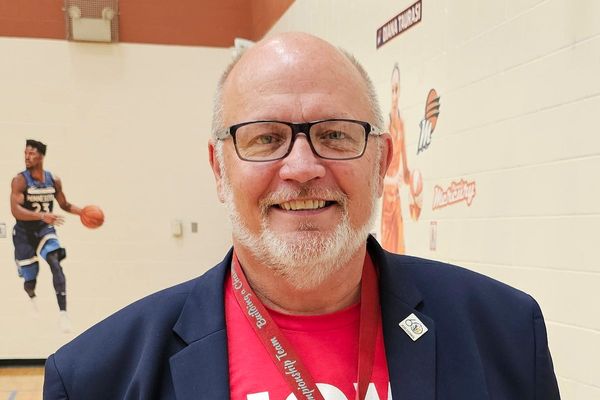Paul Milne finds it hard to shake off the time he came face to face with a saltwater crocodile during a dramatic police rescue in the Northern Territory.
The former NT Police Sergeant was called to the Mary River in the Top End in 2013 to save a woman's life after her houseboat capsized in the croc-infested waters.
"At the time I just didn't think anything of it," he said.
Mr Milne remembers having to pull the woman's body out of the river in a tinny and moving it to the water's edge so paramedics and police could conduct CPR.
Crocodiles were closing in on the group and Mr Milne said he had to act on his feet and fire his gun to keep the reptiles away.
The woman could not be saved, and as the weeks passed for Mr Milne, signs of Post-Traumatic Stress Disorder (PTSD) started to surface.
"I went to Crocodylus Park one day with the kids and saw a crocodile and I flipped out," he said.
"It just spun me out, I just stopped in my tracks, and it knocked me for six."
His traumatic experience at Mary River didn't stop with just the crocodiles.
Regular police call outs became harder for the police leader to manage, and he was struggling to turn up to work.
"One minute I'm driving a patrol car down the road in Palmerston, then my chest starts beating a million miles an hour going to a simple job," he said.
But it was the Christmas-New Year period that year that Mr Milne said "pushed him" over the line and brought his decade-long career with NT Police to an end.
He said his unit had a bad run, responding to "eight deaths within eight weeks". He said the impact took its toll on everyone.
"We were getting absolutely smashed," he said.
"Every shift, we would have a death, or go to a critical incident like a sexual assault, or a fatal."
In 2017, Mr Milne was medically retired from the force because of his PTSD and moved with his family to Victoria to access specialist mental health support that he could not get in the Northern Territory.
Mental health in your inbox
Get a selection of the best mental health content from across the ABC by subscribing to our monthly newsletter
Recent deaths have 'rocked' police force
From his home in the Dandenong Ranges, news of a "cluster" of suicide deaths involving Northern Territory police officers has hit Mr Milne hard.
NT Police have confirmed two serving police officers and one retired member have died by suicide in the past three months.
Mr Milne said he feels a mix of "despair and devastation" for the men he used to work with and is calling for cultural change to the way mental health is handled in the ranks.
"It is a major issue," he said.
"If three teachers had committed suicide it would be all over national news … what is going on, something needs to be done right now."
Mr Milne is not the first person to break ranks and speak out about mental health in the blue brigade.
ABC Radio Darwin has interviewed several current and former members about the issue, with some remaining anonymous out of fear of losing their jobs.
Acting Police Commissioner Michael Murphy said the deaths have "rocked the police force".
"Policing is a tough gig, we see things, people see things that you can't unsee ... it basically challenges your understanding of human nature," he told ABC Radio Darwin.
Acting Commissioner Murphy said an independent review into the health and wellbeing of services provided by NT Police had finished, with the findings to be discussed with the Northern Territory Police Association (NTPA).
In a statement, the association's president, Paul McCue, said there was an "overwhelming need for an overhaul of services" for members of the force.
Breaking the stigma of mental health
Mr Milne remembers what it was like facing a mental health crisis and trying to "keep face" at work.
He said he was treated differently by some colleagues when word of his PTSD got out, which he said added to his feelings of isolation.
"There is a definite stigma about it," he said.
"It was like, 'Oh no, he's on workers comp, he's probably faking it, he's a faker, he hasn't got a real condition, we can't see it, he's faking it', that's how it's seen."
The 48-year-old is calling for a re-think of the way mental health is handled in the force and said officers need regular support, during and after, their careers.
"We don't talk about it, we'll have a few beers and then we do that every week and there's a pattern where we just numb it, we just numb the trauma every week," he said.
Acting Commissioner Michael Murphy said work needs to be done to "shake the stigma attached to mental health", so officers feel comfortable to come forward.
"They can come to me directly .... they won't lose their jobs, we'll offer them all the support they can (get)," Commissioner Murphy said.
Mr Milne is now a stay-at-home father to his four children and said his schedule is tight between meeting their needs and his own, to stay healthy.
He wants his former colleagues in the Northern Territory to know that PTSD 'can creep up' and to seek help if they need it.
"You're not alone, if you need to talk to someone, please do, we are all here together, even though it doesn't feel like it sometimes and never give up," he said.







